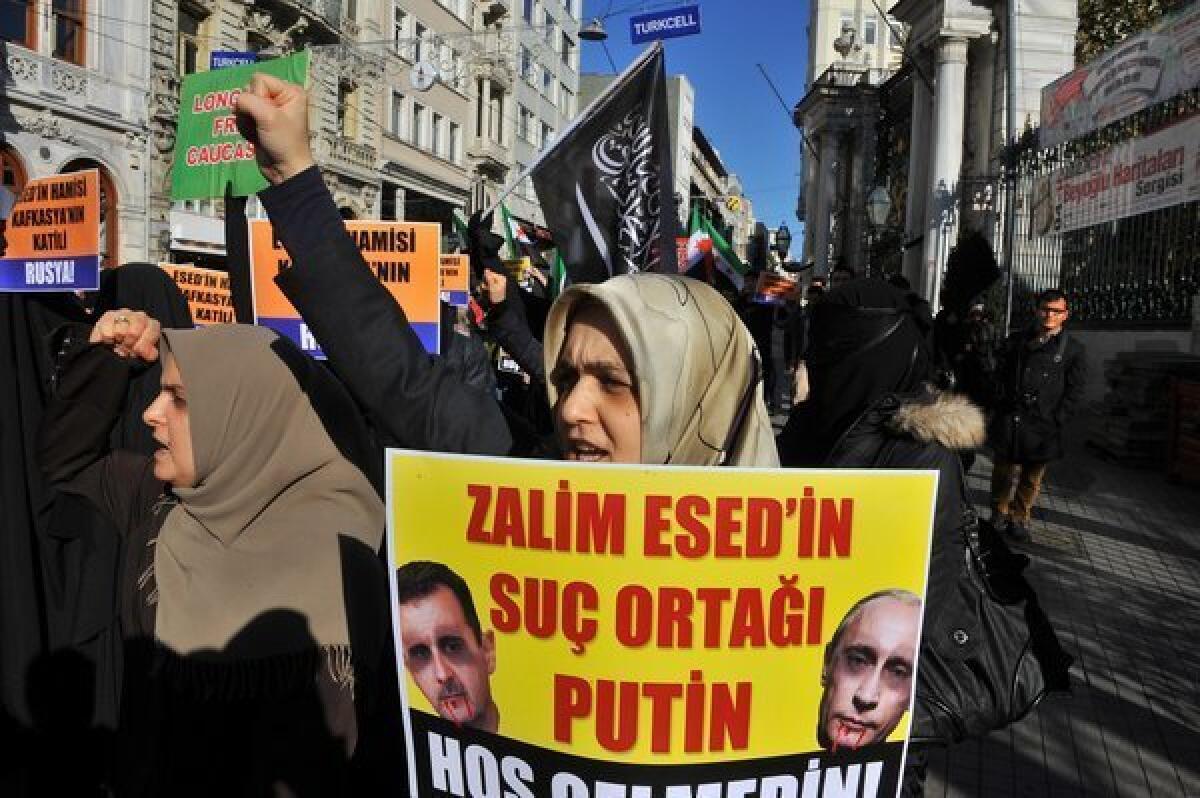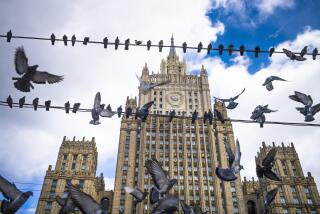In Syrian warâs end game, Moscow maneuvers away from Assad

As concerns mount that Syrian President Bashar Assad could unleash chemical weapons against his opponents, the Kremlin appears to be recalibrating its support for a desperate ally.
Russia three times has wielded its veto power in the U.N. Security Council to shield Assad from international condemnation for brutality against Syrians fighting for his ouster, a 21-month-old siege that by some accounts has taken 40,000 lives and displaced 2.5 million.
Russian President Vladimir Putin signaled the first step back from ardent defense of Assad after a meeting with Turkish Prime Minister Recep Tayyip Erdogan this week. Putin and Erdogan left their Istanbul meeting still occupying opposite positions on the need for Turkey to defend itself from stray Syrian rocket fire with NATO-supplied Patriot missiles, according to Kremlin spokesman Dmitry Peskov. But they also agreed to pursue âsome new, fresh ideasâ in hope of resolving the intractable conflict, Peskov said.
Pentagon chief Leon E. Panetta said Thursday that Western intelligence agencies had been warning in recent days that the increasingly isolated Assad may be positioning missiles to fire payloads of sarin gas against opponents.
Though Moscow and Washington have been bitterly divided over a potential role for Assadâs loyalists in a post-war Syria, the erstwhile superpowers share concern about the potential for horrific escalation if Assad turns to his poison gas arsenal for a last blast at the rebels or the neighbor states he accuses of supporting them.
Jolted out of their diplomatic standoff by the prospect of chemical warfare, Russian Foreign Minister Sergei Lavrov and U.S. Secretary of State Hillary Rodham Clinton met twice Thursday on the fringes of a human rights gathering in Dublin, Ireland. In the second meeting, they were joined by the special U.N. and Arab League envoy on Syria, Lakhdar Brahimi.
âWe havenât taken any sensational decisions,â the Associated Press quoted Brahimi as saying after the meeting. âBut I think we have agreed that the situation is bad, and we have agreed that we must continue to work together to see how we can find creative ways of bringing this problem under control and hopefully starting to resolve it.â
The U.S. State Department issued a brief statement saying that the next step would be a meeting of Brahimi and senior U.S. and Russian officials in the next few days to discuss âtaking this work forward.â
As the chief U.S. and Russian diplomats huddled in Dublin, Deputy Foreign Minister Gennady Gatilov was sending positive messages via Twitter about reports that the United States was about to declare the Al Qaeda-linked Al Nusra Front a terrorist organization. Russia has long accepted Assadâs assertions that the rebellion in Syria is driven by foreign enemies, and the U.S. branding of Al Nusra, which is allied with the rebellion, gives Moscow another patch of common ground on which to stand with Washington.
Russian officials are now modifying their stance toward Assad because it is becoming increasingly obvious that he will eventually be toppled, international security experts say.
âRussian officials certainly sound as though theyâve downgraded Assadâs survival chances,â said Stephen Sestanovich, senior fellow for Russian and Eurasian studies at the Council on Foreign Relations.
It remains to be seen, Sestanovich said, whether Moscow is just repositioning itself diplomatically ahead of Assadâs fall or seeks to play a direct role in negotiating an end to the conflict, perhaps persuading Assad to take up one of the rumored offers of foreign exile.
Syrian Deputy Foreign Minister Faisal Mekdad recently visited the Venezuelan capital of Caracas, triggering speculation that the leftist leadership of ailing President Hugo Chavez was open to giving refuge to the embattled Assad and his top lieutenants. The Guardian newspaper of Britain and Israelâs Haaretz have also reported alleged asylum offers from Cuba, Ecuador, Tunisia, Qatar, Belarus and Russia.
Andrew Tabler, Syria expert at the Washington Institute for Near East Policy, dismisses the notion that Assad would be safe in foreign exile from assassination by angry countrymen, with the possible exception of Iran. He holds out the prospect that Assad could live up to his promise never to abandon his Syrian homeland, especially if the civil war is ended by breaking the country into sectarian components. Assad is of the minority Alawite population, a Shiite Muslim-aligned sect concentrated in the mountainous coastal region of Latakia.
Assadâs fall would be a blow to Russia, no matter how Syriaâs chief ally scrambles in the civil warâs 11th hour to put itself on the right side of history, Tabler said. Opposition forces will dominate any post-Assad leadership, and many will hold a grudge against the country that propped up their nemesis through the long bloodletting.
âThe Russians donât want him. Anyone who takes him in is going to be the target of a lot of anger,â Tabler said.
Moscow wants to avoid becoming the object of bitter resentment, Tabler said, as the United States did by sheltering the shah of Iran after the Islamic Revolution, setting in motion an adversarial relationship that persists more than three decades later.
ALSO:
Probe ordered in killing of Afghan student
Famous French attractions could be left in the dark
Egyptian President Morsi appears besieged; six dead in clashes
A foreign correspondent for 25 years, Carol J. Williams traveled to and reported from more than 80 countries in Europe, Asia, the Middle East and Latin America.
More to Read
Sign up for Essential California
The most important California stories and recommendations in your inbox every morning.
You may occasionally receive promotional content from the Los Angeles Times.











